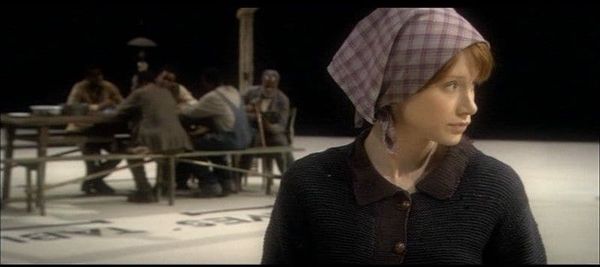Eye For Film >> Movies >> Manderlay (2005) Film Review
Manderlay
Reviewed by: Jennie Kermode

The eagerly awaited sequel to Dogville is the second part of Lars von Trier's American trilogy, each shot on a soundstage with chalk lines marking out the landscape and each featuring a different actress in the lead role of Grace.
Manderlay sees Grace (Bryce Dallas Howard) travelling with her gangster father, when they come across a Southern plantation where slavery is still being practised. With the aid of her father's "associates", she liberates the enslaved people and determines to stay with them until the next harvest to help them adjust to their new freedom.

As before, Grace's idealistic way of looking at things turns out to be somewhat at odds with human nature, but this time we learn less about other people's flaws and more about her own.
Dogville was always going to be a tough act to follow and Howard faces a particularly difficult task trying to match Nicole Kidman's performance. Naturally, events in the first film have had a major impact on the character of Grace, so that it's harder for the audience to accept her as an innocent. The tension between her apparent good intentions and self-centred desire to feel like a good person is weaker.
Wisely, von Trier shifts the focus of the story and explores the masochistic aspects of her character as a means of connecting with wider cultural tendencies in America, especially those relating to perceived victimhood. It is startling that Grace never seems to relate her own recent experiences of slavery to those of the people around her. She remains as blank as possible, separated by culture, if not by her personal history, which seems to be central to what von Trier is trying to say about race relations in modern America.
This is an examination of the belief systems and habits surrounding segregation and, as such, stands up well. Where it is least affective is in its attempt to tell a personal story.
Try as she might, Howard never makes Grace as interesting as she was before, but then she's working with weaker material. The film's biggest flaw is that we don't get to know many of the characters, so it's much harder to care about them. This seems in part to be a deliberate device, commenting on the supposed inability of white people to tell those of other races apart, but it's an expensive way to make such a comment. Furthermore, the experiences of the former slave owners, who are made to do manual labour until they see the error of their ways, are scarcely explored at all, which leaves the viewer feeling deprived of a significant part of the story.
The shortage of well-developed characters also makes it a little too easy to predict where conflicts will arise. Timothy, the man to whom Grace finds herself dangerously attracted, is suitably charismatic, but one can't help feeling that the others have been downplayed to achieve this.
Although nothing like as good as Dogville, Manderlay remains a compelling and important film. It's not as visually interesting and its moments of revelation don't have as much impact as they should, but it clearly has valuable things to say.
Don't leave until the closing credits are over.
Reviewed on: 03 Mar 2006



















